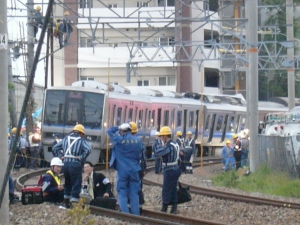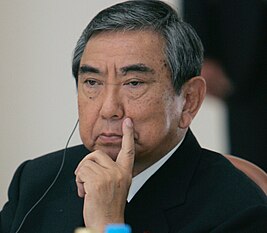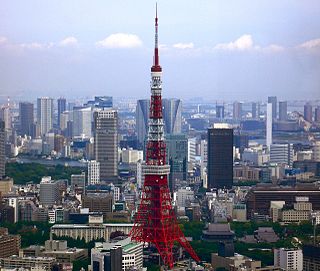 W
WAkihito is a member of the Imperial House of Japan who reigned as the 125th emperor of Japan, according to the traditional order of succession, from 7 January 1989 until 30 April 2019, Heisei era. He succeeded to the Chrysanthemum Throne upon the death of his father, Emperor Showa (Hirohito). Upon his abdication due to his age and declining health, he became Emperor Emeritus. He was succeeded by his eldest son, Naruhito, on 1 May 2019.
 W
WThe 2010 Senkaku boat collision incident occurred on the morning of September 7, 2010, when a Chinese trawler, Minjinyu 5179, operating in disputed waters near the Senkaku Islands collided with Japanese Coast Guard's patrol boats. There were several Japanese Coast Guard boats involved, including Yonakuni and Mizuki, which collided with Minjinyu 5179, plus Hateruma and other JCG boats.
 W
WThe Akihabara massacre was an incident of mass murder that took place on Sunday, 8 June 2008, in the Akihabara shopping quarter in Sotokanda, Chiyoda, Tokyo, Japan.
 W
WThe 2005 Amagasaki derailment was a fatal railway derailment which occurred in Amagasaki, Hyogo Prefecture, Japan, on 25 April 2005 at 09:19 local time, just after the local rush hour. It occurred when a seven-car commuter train came off the tracks on West Japan Railway Company's Fukuchiyama Line in just before Amagasaki Station on its way for Dōshisha-mae via the JR Tōzai Line and the Gakkentoshi Line, and the front two carriages rammed into an apartment building. The first carriage slid into the first floor parking garage and as a result took days to remove, while the second slammed into the corner of the building, being crushed against it by the weight of the remaining carriages. Of the roughly 700 passengers on board at the time of the crash, 106 passengers, in addition to the driver, were killed and 562 others injured. Most survivors and witnesses claimed that the train appeared to have been travelling too fast. The incident was Japan's most serious since the 1963 Tsurumi rail accident.
 W
WThe Dignity of the Nation , also translated as The Dignity of a State or The Dignity of Nations, is a bestselling book by Japanese essayist and mathematician Masahiko Fujiwara. The book has sold more than two million copies in Japan. A bilingual Japanese and English version, translated by Giles Murray, was published in Japan in May 2007 by IBC Publishing under the English title The Dignity of the Nation.
 W
WThe Japanese embassy hostage crisis began on 17 December 1996 in Lima, Peru, when 14 members of the Túpac Amaru Revolutionary Movement (MRTA) took hostage hundreds of high-level diplomats, government and military officials and business executives who were attending a party at the official residence of the Japanese ambassador to Peru, Morihisa Aoki, in celebration of Emperor Akihito's 63rd birthday. Although strictly speaking the crisis took place at the ambassadorial residence in the upscale district of San Isidro rather than at the embassy proper, the media and others referred to it as the "Japanese embassy" hostage crisis, and that is how it is conventionally known.
 W
WThe Great Hanshin earthquake , or Kobe earthquake, occurred on January 17, 1995 at 05:46:53 JST in the southern part of Hyōgo Prefecture, Japan, including the region known as Hanshin. It measured 6.9 on the moment magnitude scale and had a maximum intensity of 7 on the JMA Seismic Intensity Scale. The tremors lasted for approximately 20 seconds. The focus of the earthquake was located 17 km beneath its epicenter, on the northern end of Awaji Island, 20 km away from the center of the city of Kobe.
 W
WThe Heisei era refers to the period of Japanese history corresponding to the reign of Emperor Akihito from 8 January 1989 until his abdication on 30 April 2019. The Heisei era started on 8 January 1989, the day after the death of the Emperor Hirohito, when his son, Akihito, acceded to the throne as the 125th Emperor. In accordance with Japanese customs, Hirohito was posthumously renamed "Emperor Shōwa" on 31 January 1989. Heisei translates to "peace everywhere".
 W
WJuliana's, also known as Juliana's Tokyo (ジュリアナ東京), was a Japanese discothèque that operated in Shibaura, Minato, Tokyo from May 15, 1991 till August 31, 1994. It was famous for its dance platforms, on which office ladies dressed in "bodycon" clubwear would congregate, as amateur go-go dancers. The club was produced by Masahiro Origuchi for the British leisure services group Wembley PLC, and Nissho Iwai Corporation, the Japanese general trading company.
 W
WJunichiro Koizumi is a Japanese politician who was Prime Minister of Japan and President of the Liberal Democratic Party (LDP) from 2001 to 2006. He retired from politics in 2009, and he remains the sixth-longest serving Prime Minister in Japanese history.
 W
WThe Kono Statement refers to a statement released by Chief Cabinet Secretary Yōhei Kōno on August 4, 1993, after the conclusion of the government study that found that the Japanese Imperial Army had forced women, known as comfort women, to work in military-run brothels during World War II. The Japanese government had initially denied that the women had been coerced until this point. In the Kono Statement, the Japanese government acknowledged that:"The then Japanese military was, directly or indirectly, involved in the establishment and management of the comfort stations". "The recruitment of the comfort women was conducted mainly by private recruiters who acted in response to the request of the military." "In many cases they were recruited against their own will, through coaxing, coercion, etc." "At times, administrative/military personnel directly took part in the recruitments." "They lived in misery at comfort stations under a coercive atmosphere."
 W
WThe Lost Decade or the Lost 10 Years was a period of economic stagnation in Japan from about 1991 to 2001, caused by the Japanese asset price bubble's collapse in late 1991. The term originally referred to the years from 1991 to 2000, but recently the decade from 2001 to 2010 is often included so that the whole period is referred to as the Lost Score or the Lost 20 Years. Since 2020, it was proposed to also include the decade from 2011 to 2020 as the Lost 30 Years (失われた30年). From 1991 to 2003, the Japanese economy, as measured by GDP, grew only 1.14% annually, while average real growth rate between 2000 to 2010 was about 1%, both well below other industrialized nations. Later, the 2008 Great Recession, 2011 Tōhoku earthquake and tsunami and COVID-19 pandemic in Japan has greatly impacted the Japanese economy in a negative way.
 W
WMaid cafés are a subcategory of cosplay restaurants found predominantly in Japan. In these cafés, waitresses dressed in maid costumes act as servants, and treat customers as masters in a private home, rather than as café patrons. The first permanent maid café, Cure Maid Café, was established in Akihabara, Tokyo, Japan, in March 2001, but maid cafés are becoming increasingly popular. As they have done so, the increased competition has made use of some unusual tactics in order to attract customers. They have also expanded overseas to countries including China, South Korea, Taiwan, Thailand, Australia, Hungary, the Czech Republic, France, the Netherlands, Mexico, Canada, Brazil, and the United States.
 W
WMoe is a Japanese word that refers to feelings of strong affection mainly towards characters in anime, manga, video games, and other media directed at the otaku market. Moe, however, has also gained usage to refer to feelings of affection towards any subject.
 W
WThe Murayama Statement is a political statement released by former Prime Minister of Japan Tomiichi Murayama on August 15, 1995, officially titled "On the Occasion of the 50th Anniversary of the War's End". It synthesized the position of the Japanese government on historical recognition and reconciliation with Asia and other nations subjected to Japanese colonialism, primarily involving China and the Republic of Korea. It recognizes the judgements of war tribunals prescribed in Article 11 of the San Francisco Peace Treaty. In this way, the Murayama Statement played a significant role in both the reconciliation of war issues as well as the shift in both domestic and international perception of Japan.
 W
WThe Tokyo subway sarin attack was an act of domestic terrorism perpetrated on 20 March 1995, in Tokyo, Japan, by members of the cult movement Aum Shinrikyo. In five coordinated attacks, the perpetrators released sarin on three lines of the Tokyo Metro during rush hour, killing 12 people, severely injuring 50, and causing temporary vision problems for nearly 1,000 others. The attack was directed against trains passing through Kasumigaseki and Nagatachō, where the Diet is headquartered in Tokyo.